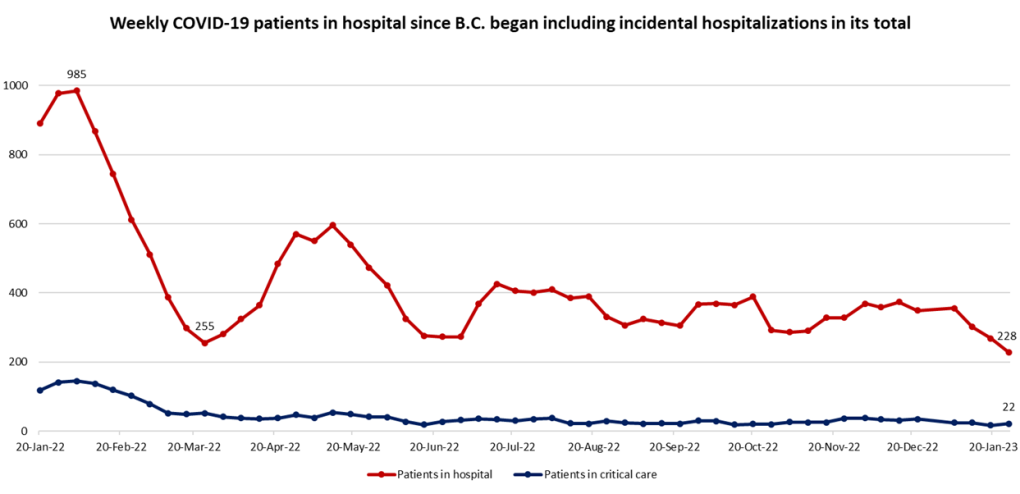Fewer COVID-19 patients in B.C. hospitals today than at any point in 2022
 A sign at the entrance to Surrey Memorial Hospital is seen on Saturday, Feb. 5, 2022. (CTV)
A sign at the entrance to Surrey Memorial Hospital is seen on Saturday, Feb. 5, 2022. (CTV)
The number of people hospitalized with COVID-19 in B.C. has reached its lowest level in more than a year.
The B.C. Centre for Disease Control reported 228 test-positive patients in hospitals across the province as of Thursday. The last time the hospital population was that low was before the BCCDC switched counting methods and began including "incidental" hospitalizations in its weekly total.
 The number of patients in B.C. hospitals with COVID-19 on Thursdays since the province started including incidental cases in its count is shown. (CTV)
The number of patients in B.C. hospitals with COVID-19 on Thursdays since the province started including incidental cases in its count is shown. (CTV)
That switch happened in January 2022. Until this week, the lowest number of patients in hospital on a Thursday since that change had been 255 on March 24, 2022.
"Incidental" COVID-19 hospitalizations are those in which a patient tests positive for the disease after being admitted to hospital for some other reason.
Before January 2022, B.C. reported only hospitalizations in which COVID-19 was believed to be the underlying cause. The last time that count was below 228 was the last day of 2021, when there were 220 patients in hospital under the old counting method.
Health officials have said between 40 and 50 per cent of the patients in hospital with COVID-19 each week are there because of the disease, while the rest are incidental hospitalizations.
OTHER DATA
Thursday's update from the BCCDC also included 408 new lab-confirmed cases of COVID-19 from the week of Jan. 15 to 21, a substantial decrease from the 560 reported the week before and the lowest total reported since the week of Oct. 30 through Nov. 5.
There were also 104 new hospital admissions – a different metric than the currently hospitalized population – during the week of Jan. 15 to 21, down from 142 initially reported during the preceding week.
Both the weekly case count and new hospital admissions are imperfect measures. The former does not include reinfections or at-home rapid antigen tests, while the latter is always revised higher in the following week's report.
Because of the limitations of the weekly case count, experts have estimated that B.C.'s official figures for COVID-19 infections are off by roughly 100-fold.
Still, both cases and new hospital admissions are trending downward, and wastewater surveillance – which was recently expanded to include communities in the Interior and on Vancouver Island – has been pointing in the same direction.
This week's wastewater data has not yet been released, but as of last week's update, every monitored treatment plant in the province was showing decreased concentrations of the coronavirus.
VACCINATION AND 'KRAKEN'
In an update last week, federal health officials said it's unclear whether the XBB.1.5 lineage of SARS-CoV-2 – also known as the "Kraken" variant – will become the dominant strain of COVID-19 in Canada, but it's proportion of the country's total infections has been rising.
Citing this risk, Chief Public Health Officer Dr. Theresa Tam and federal Health Minister Jean-Yves Duclos echoed advice from the National Advisory Committee on Immunization, which continues to urge all Canadians ages five and older to get a booster dose of a bivalent COVID-19 vaccine if they haven't already.
In B.C., 19,291 doses of vaccine were administered during the week that ended Jan. 21.
While 83 per cent of residents of all ages have received at least two doses of a COVID-19 vaccine, significantly fewer have had a booster dose. As of Jan. 22, 56 per cent had had at least three doses, with 32 per cent – mostly those in the older age groups more susceptible to serious illness – had had at least four.
CTVNews.ca Top Stories

Widow looking for answers after Quebec man dies in Texas Ironman competition
The widow of a Quebec man who died competing in an Ironman competition is looking for answers.
Tom Mulcair: Park littered with trash after 'pilot project' is perfect symbol of Trudeau governance
Former NDP leader Tom Mulcair says that what's happening now in a trash-littered federal park in Quebec is a perfect metaphor for how the Trudeau government runs things.
World seeing near breakdown of international law amid wars in Gaza and Ukraine, Amnesty says
The world is seeing a near breakdown of international law amid flagrant rule-breaking in Gaza and Ukraine, multiplying armed conflicts, the rise of authoritarianism and huge rights violations in Sudan, Ethiopia and Myanmar, Amnesty International warned Wednesday as it published its annual report.
Photographer alleges he was forced to watch Megan Thee Stallion have sex and was unfairly fired
A photographer who worked for Megan Thee Stallion said in a lawsuit filed Tuesday that he was forced to watch her have sex, was unfairly fired soon after and was abused as her employee.
Amid concerns over 'collateral damage' Trudeau, Freeland defend capital gains tax change
Facing pushback from physicians and businesspeople over the coming increase to the capital gains inclusion rate, Prime Minister Justin Trudeau and his deputy Chrystia Freeland are standing by their plan to target Canada's highest earners.
U.S. Senate passes bill forcing TikTok's parent company to sell or face ban, sends to Biden for signature
The Senate passed legislation Tuesday that would force TikTok's China-based parent company to sell the social media platform under the threat of a ban, a contentious move by U.S. lawmakers that's expected to face legal challenges.
Wildfire southwest of Peace River spurs evacuation order
People living near a wildfire burning about 15 kilometres southwest of Peace River are being told to evacuate their homes.
U.S. Senate overwhelmingly passes aid for Ukraine, Israel and Taiwan with big bipartisan vote
The U.S. Senate has passed US$95 billion in war aid to Ukraine, Israel and Taiwan, sending the legislation to President Joe Biden after months of delays and contentious debate over how involved the United States should be in foreign wars.
'My stomach dropped': Winnipeg man speaks out after being criminally harassed following single online date
A Winnipeg man said a single date gone wrong led to years of criminal harassment, false arrests, stress and depression.
































